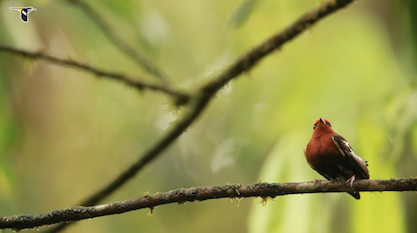 Evolution
Evolution
 Intelligent Design
Intelligent Design
 Medicine
Medicine
Yale Biologist: “Natural Selection Is Not the Only Source of Design”

“Natural selection is not the only source of design in nature,” writes Richard O. Prum, an evolutionary biologist at Yale in a mischievous article for the New York Times (“Are These Birds Too Sexy to Survive?”).
Not the only source of…design? He wrote that? Where?
Don’t get too excited. His article, excerpted from a new book, The Evolution of Beauty, isn’t arguing for intelligent design. But he uses the word design several times — four, to be exact — in a relatively short article to characterize what accounts for the capacity of flight in birds. For more on that, see the explicitly ID-oriented Illustra documentary, Flight: The Genius of Birds.
This is what I mean by mischievous. Surely a professor at Yale is smart enough to know what a provocation it is to use such language.
He focuses on one South American bird, the club-winged manakin, that in terms of Darwinian natural selection ought not to exist. The male club-winged manakin has a distinctive song and dance. The song sounds something like, Bip-WANNGG!, Bip-WANNGG!, Bip-WANNGG! That’s how it is transcribed, anyway, though I am not sure I hear it that way.
These birds are adorable, and the song necessitates a unique motion of the wings and a heavy, club-like accompanying bone structure that almost certainly comes at a steep cost.
The problem for evolution?
The male club-wings cannot have it both ways: They cannot evolve simultaneously for the most efficient flight and the most beautiful wing songs. Because the birds are rare and live far from major research laboratories, we have no data yet on how their wings affect their flight. But it’s obvious they do: In the wild, it is easy to see that male club-wings fly awkwardly. Most likely they have diminished maneuverability and efficiency.
In other words, they have evolved to be worse at flying in order to be more attractive to mates.
Evolution knows how to deal with a paradox like this: explain it away, rationalize it. That’s how evolution skeptics would characterize the move. And Professor Prum does too:
Evolutionary biologists have tried to explain away the survival costs of sexual ornaments by imagining that beauty is a so-called honest handicap: By surviving despite his awkward wing bones, the male is displaying his superior quality to mates with every Bip-WAANGG.
[…]
The clumsy wings of males could be rationalized as a handicap that provides information about the birds’ condition or genetic quality. But the observation that female club-wings have also probably made themselves less capable fliers can only be described as decadent — sexual selection leading to a decline in the capacity for survival. [Emphasis added.]
The metaphor of sexual decadence is too obvious to neglect, and Prum does not neglect it:
Once organisms evolve the capacity for subjective evaluation, and the freedom of choice, then animals become agents in their own evolution. One of the hallmarks of autonomy, of course, is the freedom to mess up.
Prum suggests that the phenomenon, discarding survival for sexiness, is more widespread than you’d think, and that it can lead species to their own destruction. Some have said much the same of national cultures, from Rome to Weimar Germany.
It is, in any event, another illustration of how evolution has the remarkable ability to explain anything and its opposite — fitness, or decadence — with equal ease. Call it “rationalizing.” Call it “explaining away.” But as others have asked, can a theory that seems to exclude nothing really be said to explain anything?
H/t: Denyse O’Leary.
